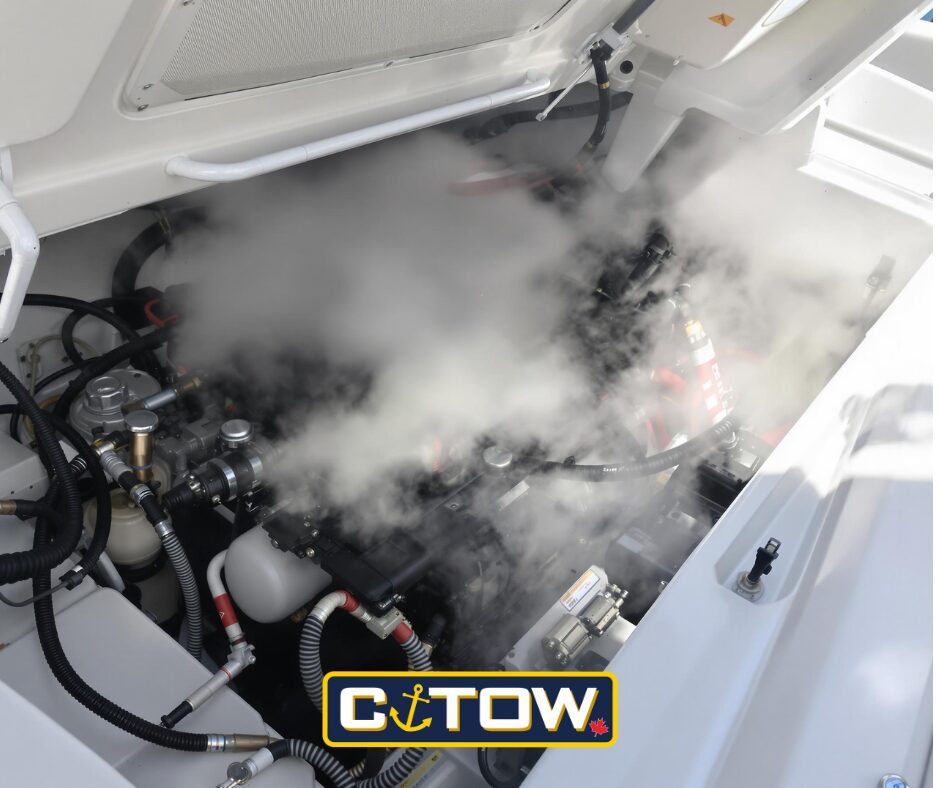
Summer boating season brings longer days on the water, but it also brings one of the most common marine emergencies: engine overheating. With over 40 years of marine assistance experience, C-Tow has responded to countless overheating incidents across Canadian waters. Here’s your essential guide to preventing, identifying, and handling this critical situation.
Why Boat Engines Overheat in Summer
Regardless of your cooling system type, summer conditions create challenges for engine temperature management:
- Higher ambient temperatures stress all cooling systems
- Increased debris and vegetation can clog water intakes (where applicable)
- Heavy usage during peak season taxes engine components
- Shallow water operations can increase sediment in water-cooled systems
Know Your Cooling System
Outboard Motors (Most Common):
- Water-cooled using lake/ocean water drawn through the lower unit
- Look for water discharge from the tell-tale (small stream of water)
Inboard/Stern Drive – Fresh Water Cooled:
- Uses coolant like a car, with a heat exchanger cooled by raw water
- Monitor both coolant levels and raw water flow
Inboard/Stern Drive – Raw Water Cooled:
- Lake/ocean water circulates directly through the engine
- Water enters through thru-hull fittings or sea strainer
Air-Cooled Engines:
- Some smaller outboards rely on air flow for cooling
- Overheating usually indicates blocked air passages or excessive load
Warning Signs: Recognize Before It’s Too Late
Universal warning signs across all systems:
- Temperature gauge climbing into the red zone
- Steam or excessive heat from the engine compartment
- Unusual engine sounds or reduced performance
- Strong smell of hot metal or burning
System-specific signs:
- Water-cooled: Reduced or no water flow from tell-tale
- Fresh water cooled: Low coolant warning lights or visible coolant loss
- Air-cooled: Reduced power under normal conditions
Immediate Action Steps
1. Stop Immediately The moment you notice overheating signs, reduce throttle to idle and find safe harbor. Continuing to run an overheating engine can cause catastrophic damage costing thousands in repairs.
2. Check Your System
- Outboards: Look for water discharge from tell-tale
- Inboards with raw water: Check raw water strainer and thru-hull
- Fresh water cooled: Check coolant levels (when engine is cool)
- Air-cooled: Ensure air intakes aren’t blocked
3. Inspect for Blockages If safely accessible, check for debris, weeds, or plastic bags blocking:
- Lower unit water intakes (outboards)
- Thru-hull fittings (inboards)
- Air intakes (air-cooled engines)
4. Allow Cooling Time Never immediately restart a hot engine. Allow at least 15-30 minutes for temperatures to normalize before attempting any restart.
Prevention: Your Best Defense
For All Systems:
- Monitor temperature gauges regularly
- Follow manufacturer’s maintenance schedules
- Carry basic tools and spare parts for your system type
Water-Cooled Specific:
- Replace water pump impellers annually (outboards/raw water systems)
- Clean raw water strainers regularly
- Flush with fresh water after saltwater use
Fresh Water Cooled:
- Check coolant levels regularly
- Inspect heat exchanger zincs
- Service cooling system per manufacturer intervals
Air-Cooled:
- Keep air intakes clean and unobstructed
- Don’t overload the engine in hot conditions
When to Call for Professional Help
Some situations require immediate professional assistance:
- Engine won’t restart after cooling
- Visible damage to cooling system components
- Repeated overheating despite apparent fixes
- You’re in dangerous waters or weather conditions
- Coolant loss with no visible leak (possible internal damage)
C-Tow’s Response to Overheating Emergencies
Our network of experienced Captains across Canada responds to overheating emergencies 24/7. We carry diagnostic tools and common replacement parts for various engine types, often resolving issues on-site. When repairs aren’t possible on the water, we’ll safely tow you to the nearest marina or boat launch.
Captain John from Lake Simcoe recently assisted a family whose outboard overheated due to a plastic bag wrapped around their lower unit intake. “A simple 10-minute fix saved their entire weekend,” he notes. “But without proper assistance, they could have been stranded for hours.”
The Cost of Preparedness
Engine overheating repairs can range from $200 for a simple impeller replacement to $15,000+ for complete engine rebuilds. C-Tow membership costs just $155 annually in Ontario – less than most single emergency service calls.
Your Summer Boating Checklist
Before your next outing:
- ✓ Know your engine’s cooling system type
- ✓ Check system-specific components (impeller, coolant, air flow)
- ✓ Verify normal operation indicators
- ✓ Carry emergency contact information
- ✓ Ensure C-Tow membership is current
Peace of Mind on Canadian Waters
With C-Tow’s 41-year legacy and Canada’s largest on-water assistance fleet, help is always within reach. Our mobile app provides instant access to assistance, real-time captain tracking, and direct communication during emergencies.
Don’t let engine overheating ruin your summer boating plans. Stay prepared, stay vigilant, and stay connected with C-Tow Marine Assistance.
For 24/7 marine assistance, call 1-888-419-2869 or use the C-Tow mobile app. Learn more about membership benefits at www.c-tow.ca
